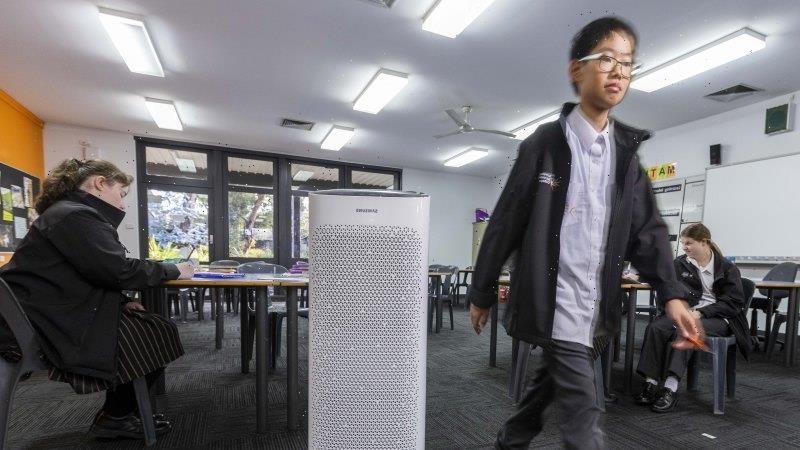Talking points
- More than 400 Victorian teachers will relinquish their jobs after failing to get vaccinated for COVID-19.
- Victorian schools will receive 110,000 air purifiers by June 1.
- Air purifiers can filter COVID-19 to make classrooms safer, but they need to be used correctly.
- In some offices and professional settings, inspections found air purifiers were either blocked or not turned on.
Victorian teachers who failed to get fully vaccinated are being officially stood down on Thursday, as schools prepare to tackle the winter months with masks off and fewer windows open.
About 420 government school teachers and school staff will have their employment officially terminated after missing the Andrews government’s mandated deadline to receive three doses of a COVID-19 vaccine.
Scoresby Secondary College is coupling air purifiers with other measures to ensure students are as safe as possible from COVID-19 transmission in winter.Credit:Wayne Taylor
A spokesperson for the Department of Education and Training said that, as of Tuesday, 99.2 per cent of the government teaching service had received three doses.
Under the orders of the Victorian Minister for Health, all school staff were required to have had three doses of a COVID-19 vaccine by March 25, unless they had a medical exemption.
As winter approaches, air purifiers will be more heavily relied upon to keep classrooms COVID-safe, but industry experts say if they aren’t used correctly, they could give a dangerously false sense of security.
Keeping windows and doors open will dramatically reduce the risk of COVID-19 infection, says Melbourne University Head of Mechanical Engineering professor Jason Monty.
“The scary side of that is it requires humans to keep them open, and that’s not going to happen in winter,” he said.
“That’s where air purifiers can really help. They can do the same job as a window or door,” he said.
The state government is providing 110,000 air purifiers to schools across Victoria, with the final delivery expected by June 1, but Monty said it was critical that they were used correctly.
“Otherwise, you are giving everyone a false sense of security,” he said.
“We often do inspections and find they aren’t on, or they are set to the lowest setting instead of set to the maximum.”
There is also a risk that air purifiers get turned off because the noise they make might be disruptive.
Air purifiers do not eliminate the risk of catching COVID-19, and work best combined with other interventions, including physical distancing, good hygiene, vaccination, masks and cleaning.
Burnet Institute partnership manager David Anderson said schools were helping drive high rates of infection in the wider community at the moment.
In the past three days, 55 people have died with COVID-19 in Victoria.
Anderson said it was safest for students to continue wearing fitted N95 masks indoors coupled with air purifiers.
“We can’t ensure safety for students,” he said. “There’s no way we can make schools or any other indoor setting 100 per cent safe. It’s [about] having as many layers of protection as possible.”
McClelland College principal Amadeo Ferra said the school identified 17 sites for good outdoor classrooms, purchased outdoor furniture and adjusted its timetable to create safe spaces for students.
The school will recommend those sites are used when the weather is appropriate during winter, and follow the other measures.
“You give your best advice and health advice, but you don’t want kids and staff freezing. I’m sure people will make the right call for themselves and their kids,” Ferra said.
Air purifiers suck in dirty air – such as dust, pollen, bushfire smoke and COVID-19 – and clean it through a filter.
But they need to be operating at maximum speed, without their airflow blocked (for example by a curtain or wall). Their pre-filters should also be changed every two weeks.
“Through winter if we have a further resurgence of COVID-19, as I’m afraid many of us expect, we might go back to recommending masks for many settings,” Anderson said.
The Department of Education recommends air purifiers be kept on all day, during and after rooms are occupied, and also advises staff keep fans and heaters running and windows open.
Monty advised against sitting next to the intake of a purifier because it meant being exposed to the dirty air being sucked in.
Scoresby Secondary College principal Gail Major said her school was well stocked for air purifiers, and was positioning them strategically to maximise their effectiveness.
She said students had been encouraged to wear winter uniforms and don jackets in class if necessary.
“We are still sanitising, we still have a small number of students and staff opting to use masks, we are highly recommending the flu vax,” she said.
Port Melbourne Primary School principal Rohan Cooper said maintenance of air purifiers was also important.
“We’re really confident we’ll be able to manage whatever comes with the change seasons.”
The Morning Edition newsletter is our guide to the day’s most important and interesting stories, analysis and insights. Sign up here.
Most Viewed in Politics
From our partners
Source: Read Full Article

